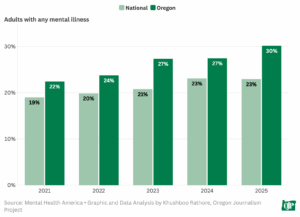No other state in the country has a higher prevalence of mental illness. At the same time, access to care in Oregon is improving.
By Khushboo Rathore
Oregon Journalism Project
As one of her key campaign promises, Gov. Tina Kotek committed herself to battling the state’s persistent mental health challenges. A recent report suggests she still has work to do.
More Oregonians struggle with mental health issues than ever before, according to Mental Health America’s newly released 2025 annual report—30% of the adult population.

That study also ranks Oregonians, youth and adults, as having the highest prevalence of mental health challenges among residents of the 50 states and the District of Columbia.
Oregon has recorded among the highest prevalence of mental illness for years. In the past few years, however, the state has devoted hundreds of millions of dollars in new spending to improve access to mental health services.
The money is making some difference. The state ranked seventh for access to care in the new report, up from 21st five years ago.
“We are seeing the benefit of these investments, but we have more work to do,” Kotek said in a statement to OJP.
Katie McLaughlin, a University of Oregon psychology professor and executive director of the Ballmer Institute for Children’s Behavioral Health, is particularly concerned about the mental health challenges of Oregon’s youth.
“The root causes of youth mental health challenges—like exposure to trauma and adversity—are not improving in the state,” said McLaughlin.
Oregon has been above the national average in prevalence of mental health issues since at least 2015, according to archived reports from Mental Health America. Oregon’s current rate of 30% is significantly higher than the national rate—23%.
Dr. George Keepers, chair of Oregon Health & Science University’s Department of Psychiatry for more than 20 years, argues that Oregon’s fragmented mental health system shares some of the blame.
“So the county is the mental health authority in Oregon,” Keepers said in an interview last year. “What happens is, counties decide what’s gonna happen within their jurisdiction, and that can be wildly different from one place to another.”
He prefers the Massachusetts model, which administers the delivery of care statewide, designing programs with best practices and requiring insurance companies to reimburse for certain kinds of behavioral care. That state ranks sixth for mental health well-being, the 2025 report shows.
“As a result of the powers they have, they are able to create coordinated systems of care that are very efficient and very effective,” Keepers said. “Now, that’s very different from Oregon with the Oregon Health Authority.”





